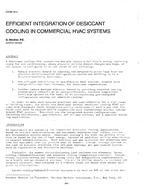
OT-88-19-4 — Efficient Integration of Desiccant Cooling in Commercial HVAC Systems
- Comments Off on OT-88-19-4 — Efficient Integration of Desiccant Cooling in Commercial HVAC Systems
- ASHRAE
A desiccant cooling HVAC system can sharply reduce a building’s energy operating costs for air conditioning, where electric utility demand charges are high, if the system is configured to do all three of the following:
- Reduce electric demand by removing the dehumidification load from the electric-utility-powered refrigeration system and shifting it to a moisture-absorbing desiccant.
- Use off-peak electricity or non-electric heat sources, coupled with energy-efficient heat recovery, for desiccant regeneration.
- Further reduce daytime electric demand by providing sensible cooling (temperature control) at an energy-efficient, elevated temperature level appropriate to the task, or by incorporating gas-energized refrigeration systems for sensible cooling.
In order to make such systems practical and cost-effective for a wide range of building types, the author has developed several desiccant cooling HVAC systems that integrate these energy-cost-saving techniques in such a way that the first cost also is reduced and is competitive with conventional all-air refrigerated HVAC systems. Described are the integrated-system configurations, including all-electric, gas-electric, and all-gas options, and a specific building application.
Units: Dual
Citation: Symposium, ASHRAE Transactions, 1988, vol. 94, pt. 2, Ottawa
Product Details
- Published:
- 1988
- Number of Pages:
- 10
- File Size:
- 1 file , 930 KB
- Product Code(s):
- D-OT-88-19-4

